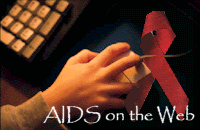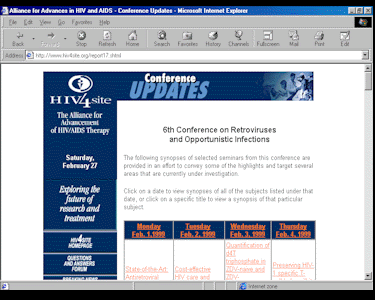 |

 |
| |
|
By John S. James and Tadd Tobias
Non-Technical Overview for Patients (and Medical Professionals) Probably the best non-technical summary of the most important treatment information at the conference is the overview by Project Inform, which was presented at a community meeting February 11 in San Francisco--a two and a half hour talk by Martin Delaney and others, with 48 slides. The slides and audio are on the Web. Go to www.projinf.org, and select 'Report from Retrovirus Conference'. Select "Slides 1-10," "Slides 11-20," etc. to hear the audio while the correct slides are automatically displayed. The slides can also be viewed separately on this site, but they are most useful with the spoken presentation. Searching the Abstracts for a Particular Drug, Condition, Other Topic, or Author Go to the official conference site, www.retroconference.org, and select 'Conference Abstracts'. Click on the blank line, type the word you are looking for, and click 'Search'.
Hearing Conference Lectures; Viewing Posters The official conference site has provided audio of some of the major lectures given at the conference; go to www.retroconference.org and select 'Hear the Lectures' or 'Hear the Symposia'. The audio quality is usually excellent, and the slides being discussed, if any, appear automatically on the screen. The conference also photographed posters, and will put some of them on the site, with presenters' permission. None are online at the time of this writing, so we do not know how well the information will transmit. (Posters not designed for the Web can be hard to read, especially if they use widely varying sizes of type.) Much of the new information at the conference was presented in "slide sessions"--which are different from the "lectures" and "symposia" (some of which also used slides). No "slide sessions" are on the Web at this time, although some were recorded for Web transmission. Sometimes there will be difficulties setting up one's computer system to receive the audio transmissions. Finding Mainstream News Reports of Treatment Developments The most complete source for mainstream news media reports about AIDS, including treatments, is AEGIS (AIDS Education Global Information System), www.aegis.com, which now has about 700,000 searchable articles and abstracts. Many of these items are wire service or other news reports; others are technical abstracts, for example new items being added to AIDSLINE. At the site, select 'Search', and follow the instructions provided. There is no way to restrict searches to reports from a particular conference. Finding Expert Commentary and Discussion on a Topic The most extensive next-day conference summaries are on the Medscape site (formerly HealthCare Communications Group), hiv.medscape.com (*do not* use the 'www.'); these summaries are written by AIDS physicians and other experts, and the site offers optional CME credit for medical professionals. This site requires a one-time registration process, which takes about 5 minutes and is free; you need to make up a user name and password and save them for later use if needed. (Your computer can save this information and log you on automatically in the future; but save your name and password anyway, in case you want to use the site from a different computer.) Two different searches are provided: either a search of the Retroviruses conference summaries only, or of the entire Medscape site. To search the Retroviruses summaries, select 'Conference Summaries' under HIV/AIDS Resources', then select 'The 6th Conference on Retroviruses and Opportunistic Infections'. About two thirds of the way down the page, under 'Conference Summaries Search', enter the word or words you are looking for. Hint: The summaries retrieved are often quite long. To avoid having to skim through one when you are looking for a particular topic only, use the search function in your browser (usually under the Edit menu) to find a drug name or other important word you are looking for. This is a local search which does not involve the Internet, but only looks through the page which is showing on your screen. A few browsers do not have this local search function (including the stripped-down Internet Explorer provided with the new Windows CE portable machines). To search the whole Medscape site, you can use the 'Search Medscape' box which appears at the upper left of most of the Medscape screens; just type a word in the box provided, and click 'GO'. This search is important because you are likely to find a number of articles which show what experts are thinking about a particular drug or other topic. This search is not AIDS-specific, as Medscape covers many medical areas; but if you search for a drug or other word related to AIDS, the articles retrieved are likely to be relevant. You can also use the extended search box which appears at the bottom of most Medscape pages; it allows a free search on AIDSLINE, MEDLINE, or other databases, as well as the Medscape site. You can enter a date range when searching the Medscape site, but only after having done a search, when you are offered an opportunity to refine it. Check that the starting date is '0' (meaning now), unless you want to retrieve older articles only. Several other Web sites have provided original expert summaries from the Retroviruses conference. Usually these reports are not so large that a search is needed; instead, it may work better to look through a list of a dozen or fewer titles, and choose which articles to read. JAMA HIV/AIDS Information Service (Journal of the American Medical Association) www.ama-assn.org/special/hiv, then select the coverage of the 6th Conference on Retroviruses and Opportunistic Infections.) In addition to news coverage from Reuters (organized by day or by topic), this site features three perspective reports written by JAMA correspondents, and two extensive expert essays: Basic Science, by Alan Landay, Ph.D., and Opportunistic Infections by William Powderly, M.D. HIV4site (The Alliance for the Advancement of HIV/AIDS Therapy, www.hiv4site.org/report17.shtml).
This site has over 70 synopses, about one paragraph each in length. Topics include new antiretroviral agents, viral resistance and virologic failure, immunology, cost-effective HIV care, and metabolic consequences of protease inhibitors. NATAP (National AIDS Treatment Advocacy Project,www.natap.org). Seven technical reports (as of February 17) cover aspects of antiretroviral therapy, origin of HIV-1, and review and summary of the late-breaker session. CATIE (Community AIDS Treatment Information Exchange, www.catie.ca/aidsinfo.nsf/conference+reports). At press time 15 different reports were available in English and French. They focus on clinical issues such as discontinuing PCP prophylaxis, "protease sparing" combinations, and nevirapine-induced methadone withdrawal. The Body (www.thebody.com/confs/retro99/retro99.html). Short summaries written by physicians (at press time, 16 reports) cover mainly poster discussion sessions, which are oral presentations of a few related abstracts; topics include treatment naive patients, heavily pre-treated patients, immunology and pathogenesis, adherence, resistance testing, metabolic complications, and antiretroviral agents. HIVandHepatitis.com (www.hivandhepatitis.com/html/hiv_aids.html). Currently includes over 10 summaries, with conference news, late-breaker sessions, combination therapies, Kaposi's sarcoma treatment advances, lipodystrophy, immune reconstitution, perinatal transmission, and antiretroviral strategies. AIDS Treatment News Published twice monthly Subscription and Editorial Office: P.O. Box 411256 San Francisco, CA 94141 800/TREAT-1-2 toll-free U.S. and Canada 415/255-0588 regular office number Fax: 415/255-4659 E-mail: aidsnews@aidsnews.org
Editor and Publisher: John S. James Associate Editor: Tadd T. Tobias Reader Services: Tom Fontaine and Denny Smith Operations Manager: Danalan Richard Copeland Statement of Purpose: AIDS Treatment News reports on experimental and standard treatments, especially those available now. We interview physicians, scientists, other health professionals, and persons with AIDS or HIV; we also collect information from meetings and conferences, medical journals, and computer databases. Long-term survivors have usually tried many different treatments, and found combinations which work for them. AIDS Treatment News does not recommend particular therapies, but seeks to increase the options available. Subscription Information: Call 800/TREAT-1-2 Businesses, Institutions, Professionals: $270/year. Includes early delivery of an extra copy by email. Nonprofit organizations: $135/year. Includes early delivery of an extra copy by email. Individuals: $120/year, or $70 for six months. Special discount for persons with financial difficulties: $54/year, or $30 for six months. If you cannot afford a subscription, please write or call. Outside North, Central, or South America, add air mail postage: $20/year, $10 for six months. Back issues available. Fax subscriptions, bulk rates, and multiple subscriptions are available; contact our office for details. Please send U.S. funds: personal check or bank draft, international postal money order, or travelers checks. ISSN # 1052-4207 Copyright 1999 by John S. James. Permission granted for noncommercial reproduction, provided that our address and phone number are included if more than short quotations are used. |

© 1997-99 BEI
 Where to look on the Web for information about the 6th
Conference on Retroviruses and Opportunistic Infections
(Chicago, Jan. 31 - Feb 4) depends on what you want.
Where to look on the Web for information about the 6th
Conference on Retroviruses and Opportunistic Infections
(Chicago, Jan. 31 - Feb 4) depends on what you want.
 The HIV4site dozens of articles on various retrovirus issues
The HIV4site dozens of articles on various retrovirus issues